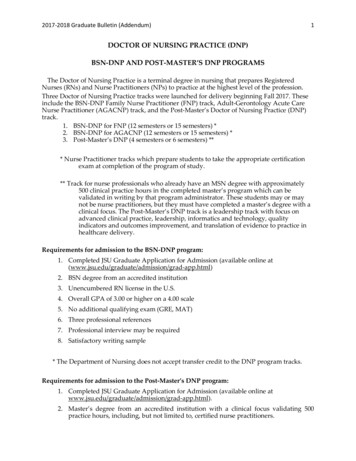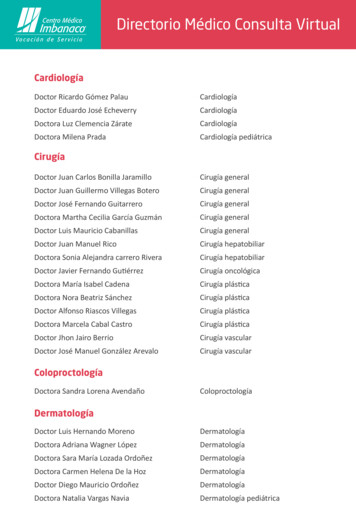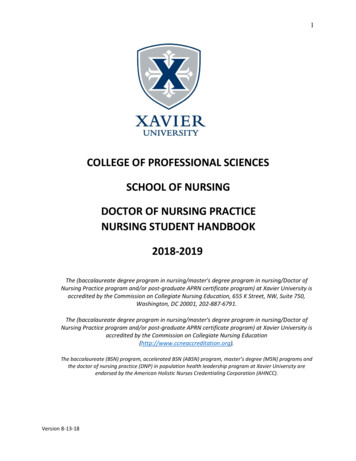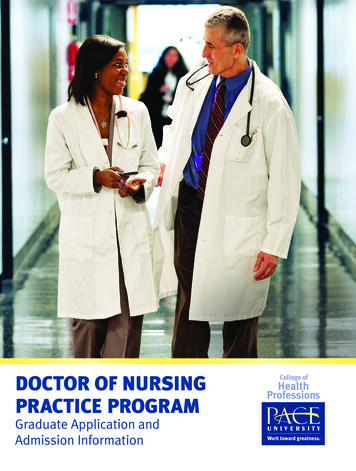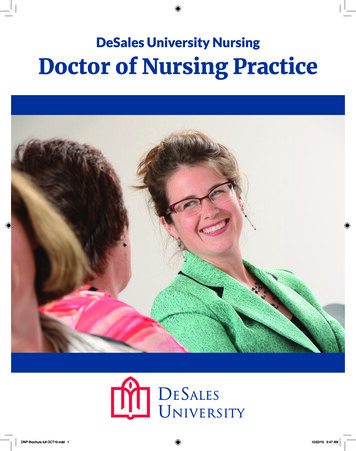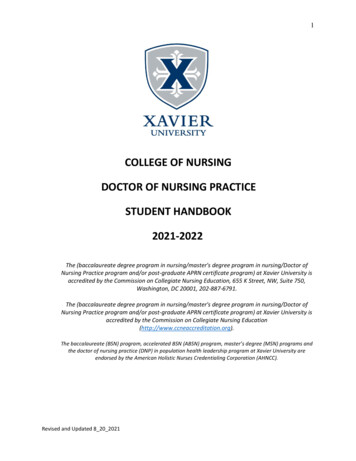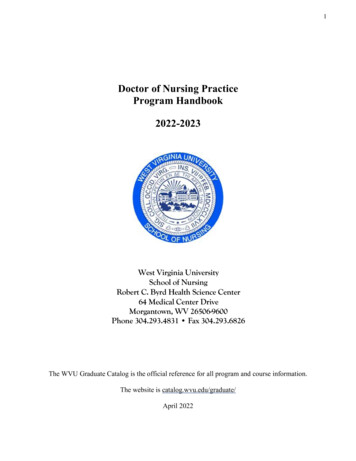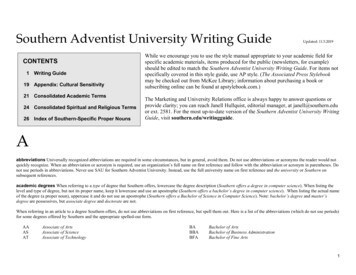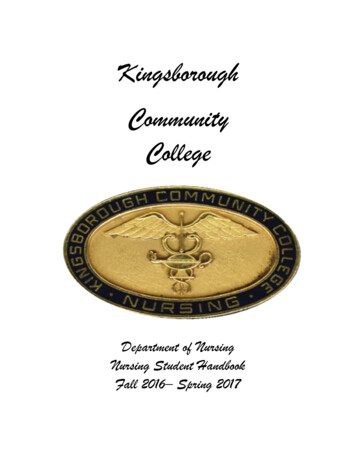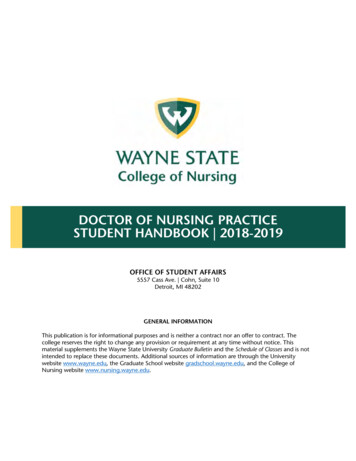
Transcription
DOCTOR OF NURSING PRACTICESTUDENT HANDBOOK 2018-2019OFFICE OF STUDENT AFFAIRS5557 Cass Ave. Cohn, Suite 10Detroit, MI 48202GENERAL INFORMATIONThis publication is for informational purposes and is neither a contract nor an offer to contract. Thecollege reserves the right to change any provision or requirement at any time without notice. Thismaterial supplements the Wayne State University Graduate Bulletin and the Schedule of Classes and is notintended to replace these documents. Additional sources of information are through the Universitywebsite www.wayne.edu, the Graduate School website gradschool.wayne.edu, and the College ofNursing website www.nursing.wayne.edu.
TABLE OF CONTENTSOVERVIEW . iHistory. iMission Statement . iiPhilosophy. iiCollege of Nursing Administrative Structure . ivStudent Services - Office of Student Affairs (OSA) . vThe Doctor of Nursing Practice. 1Three Paths to the DNP degree . 2Program Pathway Comparison . 3DNP Program Terminal Objectives . 5Program Options . 6Specialty Clinical Courses . 6Changing Clinical Specialties . 7Statistics Requirement . 7Graduate School Doctoral Residence Requirement . 7Michigan License . 7Distance Learning Program . 7ACADEMIC REGULATIONS AND PROGRESSION POLICIES .Time Limit to Complete DNP Requirements .Mark of “I” Incomplete .Withdrawal from Nursing Courses .Authorized Leave of Absence Policy .Scholarship Guidelines .Course Grading Scale .10121212121313REQUIREMENTS FOR THE CLINCIAL AND DNP PRACTICUM COURSES .Health Clearance .Health Clearance Requirements .Check List for Clinical Requirements .14141417NUR 7030 PRETEST PROCESS . 18NUR 7030 Process . 18STUDENT INJURY PROCESS . 19Student Injury Process . 19Bloodborne Pathogen Exposure Plan . 20ACADEMIC ADVISING AND PROGRAM PLANNING . 21Benchmarks for Progression Through The Program . . 21Degree Requirements. 21Advising . 22Expectations of Advisor . 22Expectations of Students. 23
.The Interim Plan of Work23The Final Plan of Work . 24Change in Plan of Work . 24Transfer of Credit . 24DOCTOR OF NURSING PRACTICE PROJECT COMMITTEE MEMBER ROLES .The Role of the DNP Project Chair .The DNP Project Reader .The DNP Project Consultant .Change in Committee Members.DNP Project and the IRB Process .252525252526THE PRELIMINARY EXAMINATIONS .Eligibility to Sit for Preliminary Exam .Established Dates .Procedures for Written Preliminary Exam .The Written Component of the Preliminary Exam .The Oral Component of the Preliminary Exam .Goals of the Oral Preliminary Examination.Procedures for Oral Preliminary Exam .Evaluation of Oral Preliminary Exam .272727272731313131DNP DEGREE CANDIDACY . 32Candidacy Requirements . 32Form required. 32Procedure . 32DOCTOR OF NURSNG PRACTICE PROJECT . 33Types of DNP Project . 33Identifying a Topic for Evidence-based DNP Project . 34Process of Writing . 34DNP Project . 37The Final Written DNP Project Product . 37The Final DNP Project Public Presentation . 41Final Steps to the DNP Degree . 42GRADUATION . 43Commencement . 43Convocation . 43UNIVERSITY STUDENT CODE OF CONDUCT . 441.0 Preamble . 442.0 Definitions . 443.0 Proscribed Conduct – Standards & Jurisdiction . 464.0 Prohibited Conduct . 46ii
. 5.0 Disciplinary Sanctions486.0 Communication of Notices to Students: Appeals andAppearances by Students Information. 497.0 Interim Suspension . 508.0 Hearing Committee Panels . 509.0 Student Conduct Officer . 5110.0 Preliminary Procedure . 5211.0 Fact-Finding Procedures . 5412.0 Procedure in Non-Academic Misbehavior Cases . 5513.0 Procedure in Academic Misbehavior Cases . 5514.0 Informal Disciplinary Conference . 5615.0 Hearing Procedures . 5716.0 Hearing by the Committee . 5917.0 Student Organizations . 5918.0 Appeal Process . 6019.0 Inherent Authority. 61COLLEGE OF NURSING STUDENT GRADE APPEALS POLICY . 62Basic Principles of the Appeals Process . 62Grounds for Appeal. 62Procedure . 62Informal Review . 62Formal Appeal . 62Instructor Level . 62Assistant Dean Level . 63College Hearing Panel Level . 63Dean’s Level. 63University Level Grade Appeals Procedure . 64Basic Principles of the Grade Appeals Process . 64REGISTRATION . 67Registration and Scheduling Office . 67Registration Services . 67Student Considered Withdrawn . 67DNP DOCTORAL NURSING COURSES REQUIRING WRITTEN CONSENT . 68NUR 8990 . 68RESOURCES .69Financial Assistance.69FAFSA (Free Application For Federal Student Aid .69College of Nursing: Fellowships, Scholarships and Emergency Loans.69Nurse Faculty Loan Program (NFLP) .69Graduate Assistance in Areas of National Need Fellowship (GAANN) .69Wayne State University Scholarships and Fellowships .69Other Awards .70iii
The Office of Scholarships and Financial Aid .70Bulletin Boards .71Mailboxes .71Publications .71Student Organizations .71The College of Nursing Council .71The Doctoral Student Forum .72WSU Chapter of the National Student Nurses’ Association .72Chi Eta Phi Sorority, Inc. .72Sigma Theta Tau .72The Alumni Association .72Alumni/Student Mentoring Program .72STUDENT SERVICES - Wayne State University .73Student Services Information - Alphabetical Listing.73College of Nursing Services . 81College of Nursing Standing Committees with Undergraduate Student Rep. Positions . 82iv
OVERVIEWWAYNE STATE UNIVERSITYCOLLEGE OF NURSINGHISTORYThe Wayne State University College of Nursing began in 1930 as one of the departments of theCollege of Liberal Arts. During the first fifteen years, the nursing programs became so varied, theenrollment so large, and the contribution to the total community so important that reorganizationwas necessary. In 1944, at the request of the College of Liberal Arts, the Board of Educationauthorized the establishment of the Wayne University College of Nursing. The College began tofunction as one of the components of the University in the spring of 1945.In 1947 under the leadership of Katherine Faville, the College’s first dean, the faculty assumedfull responsibility for teaching clinical nursing courses. This was the first time the shifting ofclinical teaching from hospital staff to nursing faculty was initiated. This model has now beenincorporated by colleges and schools of nursing nationwide. Graduates from the program wereeligible to take the Michigan examination for the registered nurse license.Since 1945, the College has offered programs leading to the degree of Master of Science inNursing. These programs offer advanced practice preparation for nurse practitioners and clinicalnurse specialists.In 1975, the College developed a Doctor of Philosophy in Nursing program. This was one of thefirst opportunities for doctoral study in the United States. To date, over 195 PhD degrees innursing have been awarded.In 2008, the College established the Doctor of Nursing Practice program.i
MISSION STATEMENTThe College of Nursing is an integral part of Wayne State University, a major research universitywith a multicultural urban teaching, research, and service mission.The College of Nursing is regionally, nationally and internationally recognized for educatinggraduate and undergraduate students as practitioners and scholars who provide leadership for theprofession and discipline of nursing.The College of Nursing is committed to research and scholarly activity to contribute to thediscipline of nursing: the body of knowledge of care and the human health experience in diverseenvironmental contexts.The College of Nursing excels in the development, application and dissemination of knowledge topromote health and well-being for peoples of communities, the state, the nation and the worldthrough teaching, research, and public service.PHILOSOPHYThe College of Nursing functions within the context of Wayne State University and supports thecentral goals and mission of the university. These goals are to nurture the intellectual abilities ofstudents and faculty and to provide education, research, and community service. As an urbanuniversity, Wayne State accepts responsibility for a reciprocal partnership with the community,using resources and knowledge in dealing with human life.Nursing is an academic discipline and profession. As a discipline, nursing develops its body ofknowledge using research as the major mode of discovery and validation. The scholarlyenvironment of the university enhances the research and theory development endeavors of theCollege of Nursing. As a profession, nursing uses knowledge creatively in response to the healthcare needs of society. Experience in a variety of clinical settings is the primary mode for thedevelopment of practice competencies. The urban context of the university provides a setting forexploring the application of knowledge to professional nursing practice.The concepts that order the discipline and profession of nursing are derived from knowledgeabout human beings, health care, and environment. These concepts give identity to professionalnursing practice, direct inquiry, and theory development.The College of Nursing supports the importance of liberal arts, humanities, and sciences. Facultybelieves that programs designed for the preparation of nurses must be composed of theintellectual, social, and technical components of a liberal and professional education that areavailable to students within an institution of higher learning. Faculty affirms the necessity andvalue of clinical practice within a professional nursing program.The faculty believes that learners are self-directed and actively participate in the learning process.Self-direction encourages the development of personal goals and values significant to theprofession of nursing. Knowledge acquisition, capacity for critical inquiry, reflection anddecision-making prepares learners to respond to issues that confront them as professionals.Learners from diverse backgrounds enter the College of Nursing to begin or continue theirii
education within the academic discipline of nursing. Faculty believes that the diversecharacteristics of its students add to the richness of the learning experience. The program seeks toaccommodate the special needs, interests, and abilities of the students. The faculty supports theright of students to question, challenge, and debate within the context of inquiry as an essentialingredient in the student’s development. Continuing evaluation on the part of the students andfaculty is essential to sustain the integrity of the program.The faculty of the College of Nursing, as members of the academic community, recognizes thatits professional functions extend beyond contributions to formal teaching. Research, practice, andcommunity service are also expectations of the faculty role. The faculty views as essential:academic freedom, shared governance, opportunity to develop knowledge, and responsibility toincorporate new knowledge into teaching and nursing practice. The faculty assumes responsibilityfor enhancing the image of the College of Nursing and the University locally, nationally, andinternationally through various avenues including research, scholarship, practice, consultation,and participatory decision-making.iii
ADMINISTRATIVE STRUCTUREiv
STUDENT SERVICESCollege of Nursing - Office of Student Affairs (OSA) –313-577-4082, toll free 888 837-0847E-mail: nursinginfo@wayne.edu10 CohnFAX: 313 577-6949website: www.nursing.wayne.eduThe Office of Student Affairs (OSA) is responsible for a variety of activities, including recruitment,admissions, orientation, retention, academic support, and undergraduate academic advising. The Office alsomanages the admissions, enrollment, registration, financial aid and the scholarship programs of the Collegeof Nursing.ADMINISTRATIONDr. Kristina AaronAssistant Dean, Enrollment & Student ServicesOffice of Student Affairskaaron@wayne.eduACADEMIC STAFFGregory Sikora MowersAcademic Services OfficerSikora.mowers@wayne.eduAreas of Responsibility Administrative responsibility for the Office ofStudent Affairs Advisor to Traditional BSN students Admission for Traditional BSN ProgramAlicia ScheerhornAcademic Services OfficerAlicia.scheerhorn@wayne.edu Admission for PhD Program Admission for DNP ProgramFelicia GraceAcademic Services Officer IV Admission for CD2 & RNBSN ProgramsAdmission for MSN ProgramAdvisor to BSN for Veterans pathwayAdvisor to RN to BSN studentsfgrace@wayne.eduVacantAcademic Services Officer Recruitment and admission for the College ofNursingv
The Doctor of Nursing PracticeThe College of Nursing, located in the culturally rich city of Detroit, draws its strength from therich tapestry of the urban experience. Established in 2008, the Doctor of Nursing Practice (DNP)is a program designed to prepare the nurse at an advanced level of nursing science. The programemphasizes the development of the student’s capacity to impact the clinical setting as leaders andeducators and to utilize clinical research to improve and transform health care. This program isbased on the understanding that nursing provides services, which include the direct care ofindividual clients, management of care for populations, administration of nursing systems, anddevelopment and implementation of health policy. Advanced practice nurses with practicedoctorates will address significant practice issues in a scholarly way, adopt broad systemperspectives for health promotion and risk reduction, act as agents of change that transformclient/community care, participate in the on-going evaluation of health care outcomes, and assistin the translation of research that leads to positive nursing practice changes.The purposes of the Doctor of Nursing Practice program are: To prepare clinically focused advanced practice nurses who are capable of translatingknowledge into the clinical setting that contributes to the positive development ofindividuals, families, communities, society and the discipline of nursing. To prepare clinically focused advanced practice nurses who will be capable of addressingthe multiple weaknesses in the current health care systems through roles as leaders,educators and agents of change. To prepare leaders for the discipline and profession of nursing that will have the skills toaddress issues of health disparities in an urban environment.Applicants can enter the DNP program as a post-BSN student, as a student who has attained amaster’s of science in nursing (MSN) degree with a clinical specialty, or as a student who hasattained a master’s of science in nursing (MSN) degree without a clinical specialty. Post-BSNstudents will complete training in a clinical specialty as part of their DNP degree, which willqualify them to sit for clinical specialty certification. Post-MSN students who do not currentlyhave a clinical specialty will take classes as part of the DNP that qualify them to sit for clinicalspecialty certification.There are three paths for students to accomplish the requirements for the DNP degree in Nursing.These paths offer options to applicants based on their present educational level and professionalcareer pathway: One path is for students entering the program post-BSN and two paths are forthose entering post-MSN. Opportunities are available for full-time and part-time study.The Three Pathways are shown in Figure 1.1
Figure 1: Three PathwaysPath 1Path 2Path 32
Program pathways comparisonD.N.P. Program PathwaysRequired Courses Comparison ChartB.S.N. to D.N.P.M.S.N. (APRN certified)M.S.N. (need certification)Leads to D.N.P. degree and clinicalcertificationFocus: Clinical specialty certification,Clinical Inquiry, leadershipdevelopment, and translation of researchinto practice (Michigan RN licenserequired)Leads to D.N.P. degreeFocus: Clinical Inquiry, leadershipdevelopment, and translation ofresearch into practice (Michigan RNlicense required, SpecialtyCertification required)Leads to D.N.P. degree and clinicalcertificationFocus: Clinical specialtycertification, Clinical Inquiry,leadership development, andtranslation of research into practice(Michigan RN license required)PROGRAM TOTAL CREDITS:PROGRAM TOTAL CREDITS:PROGRAM TOTAL CREDITS: 78* 4378*Prerequisite: graduate stats course prior to start of DNP Program (CON offers NUR 7000 3 cr in S/Ssemester).THEORYTHEORYTHEORYNUR 8620 Foundations of Nursing as aDiscipline 3 cr.NUR8625 Evidence Based NursingPractice: Theoretical andMethodological Issues 3 cr.NUR 8620 Foundations of Nursingas a Discipline 3 cr.NUR8625 Evidence Based NursingPractice: Theoretical andMethodological Issues 3 cr.NUR 8620 Foundations of Nursingas a Discipline 3 cr.NUR8625 Evidence Based NursingPractice: Theoretical andMethodological Issues 3 cr.Total Credits 6 cr.Total Credits 6 cr.Total Credits 6 cr.DOMAIN OF KNOWLEDGEDOMAIN OF KNOWLEDGEDOMAIN OF KNOWLEDGENUR 8210 Determinants of Health 3 cr. NUR 8210 Determinants of Health 3 NUR 8210 Determinants of Health 3NUR 8650 Advanced Professionalcr.cr.leadership 3 cr.NUR 8650 Advanced Professional NUR 8650 Advanced ProfessionalNUR 8615 Informatics in Nursing 3 cr. leadership 3 cr.leadership 3 cr.NUR 8630 Conceptual Methodologies in NUR 8615 Informatics in Nursing 3 NUR 8615 Informatics in Nursing 3Health Policy Leadership and Ethics 3 cr.cr.cr.NUR 8630 ConceptualNUR 8630 ConceptualNUR 8635 Benchmarking/ClinicalMethodologies in Health PolicyMethodologies in Health PolicyPractice Evaluation 3 cr.Leadership and Ethics 3 cr.Leadership and Ethics 3 cr.NUR 8635 Benchmarking/Clinical NUR 8635 Benchmarking/ClinicalNUR 8065 Health Economics/ Policy Practice Evaluation 3 cr.Practice Evaluation. 3 cr.Evaluation/Vulnerable Populations 3 crNUR 8065 Health Economics/
The Doctor of Nursing Practice The College of Nursing, located in the culturally rich city of Detroit, draws its strength from the rich tapestry of the urban experience. Established in 2008, the Doctor of Nursing Practice (DNP) is a program designed to prepare the nurse at an advanced level of nursing science. The program
